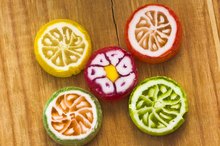Stevia Vs. Saccharin
Stevia and saccharin are both sweeteners you can use as sugar substitutes. Stevia is a natural sweetener and saccharin is an artificial sweetener 2. The Food and Drug administration has approved both sweeteners for general use in food and beverages.
Stevia
Stevia is a genus of approximately 240 species of plants native to South and Central America, with some species found in Arizona, Texas and New Mexico. According to the "Encyclopedia of Herbal Medicine,” the leaves of the Stevia rebaudiana plant are approximately 200 times sweeter than table sugar. Stevioside and rebaudioside are the glycosides responsible for the sweet taste of stevia. These glycosides are approximately 300 times sweeter than sugar. As a sugar substitute, stevia is generally a combination of the leaves, an extract of the leaves plus purified steviosides.
- Stevia is a genus of approximately 240 species of plants native to South and Central America, with some species found in Arizona, Texas and New Mexico.
- According to the "Encyclopedia of Herbal Medicine,” the leaves of the Stevia rebaudiana plant are approximately 200 times sweeter than table sugar.
Stevia Benefits
Stevia & Testosterone
Learn More
Stevia has uses as both a sweetener and as a medication. Since stevia does not have calories, and it is not made from sugar cane, individuals with a disturbed carbohydrate tolerance and diabetes can safely consume stevia. In 2008, the Food and Drug Administration recognized highly purified stevia as a safe general-purpose sweetener. The European Food Safety Authority concluded in 2010 that 5.5 mg steviol equivalents per kilogram taken twice a day did not have effects on blood pressure in either diabetics or nondiabetics. Additionally, the same doses did not affect glucose homeostasis in people with type 2 diabetes. The Food and Drug Administration’s Acceptable Daily Intake for stevia is 4 mg per kilogram of body weight per day for steviol glycosides.
- Stevia has uses as both a sweetener and as a medication.
- Since stevia does not have calories, and it is not made from sugar cane, individuals with a disturbed carbohydrate tolerance and diabetes can safely consume stevia.
Saccharin
Saccharin is an artificial sweetener 23. Its basic compound is sulfilimine. Saccarin is 300 times sweeter than sugar. Each teaspoon of saccarin contains 0 calories and less than 1 g carbohydrate. In the 1970’s, this sweetener carried a warning label due to suggestions, from animal studies, of a risk of bladder cancer associated with it. However, in 2000, the National Cancer Institute confirmed the safety of saccharin in humans and decreed that the sweetener does not cause cancer 2.
Saccharin Benefits
Canderel Side Effects
Learn More
Many people find that saccharin has an aftertaste of lasting sweetness. Therefore, several manufacturers now mix saccharin with other artificial sweeteners to counteract this aftertaste. Additionally, saccharin does not induce a high glycemic response, meaning it does not raise your blood glucose levels. This is especially important for diabetics. Saccharin is also one of the artificial sweeteners approved for use during pregnancy.
- Many people find that saccharin has an aftertaste of lasting sweetness.
- Therefore, several manufacturers now mix saccharin with other artificial sweeteners to counteract this aftertaste.
Related Articles
References
- EFSA European Food Safety Authority; Scientific Opinion on the Safety of Steviol Glycosides for the Proposed Uses as a Food Additive; April 2010
- National Cancer Institute; Artificial Sweeteners and Cancer; May 2009
- Elmhurst College: Saccharin - The Oldest Sweetener Sweet'N Low, Sugar Twin
- "Encyclopedia of Natural Medicine"; Michael Murray and Joseph Pizzorno; 1997
- "Encyclopedia of Herbal Medicine: The Definitive Home Reference Guide to 550 Key Herbs With All Their Uses as Remedies for Common Ailments"; Andrew Chevallier; 2000
- Giuffre L, Romaniuk R, Ciarlo E. Stevia, ka'a he'e, wild sweet herb from South America - An overview. Emir J. Food Agric. 2013;25(10):746-750. doi:10.9755/ejfa.v25i10.16405
- USDA. Stevia. Updated April 2019.
- Tandel KR. Sugar substitutes: Health controversy over perceived benefits. J Pharmacol Pharmacother. 2011;2(4):236–243. doi:10.4103/0976-500X.85936
- Regnat K, Mach RL, Mach-Aigner AR. Erythritol as sweetener-wherefrom and whereto?. Appl Microbiol Biotechnol. 2018;102(2):587–595. doi:10.1007/s00253-017-8654-1
- Samakkarnthani P, Payanundana M, Sathavarodom N, Siriwan C, Boonyavarakul A. Effect of stevia on glycemic and insulin responses in obese patients - A randomized, double-blind, placebo-controlled crossover study. Diabetes. 2018;67(Suppl 1). doi:10.2337/db18-790-P
- Dyrskog SE, Jeppesen PB, Chen J, Christensen LP, Hermansen K. The diterpene glycoside, rebaudioside A, does not improve glycemic control or affect blood pressure after eight weeks treatment in the Goto-Kakizaki rat. Rev Diabet Stud. 2005;2(2):84–91. doi:10.1900/RDS.2005.2.84
- Ashwell M. Stevia, Nature's zero-calorie sustainable sweetener: A new player in the fight against obesity. Nutr Today. 2015;50(3):129–134. doi:10.1097/NT.0000000000000094
- USDA. Has Stevia been approved by FDA to be used as a sweetener?. Updated March 2018.
- Nunes AP, Ferreira-Machado SC, Nunes RM, Dantas FJ, De Mattos JC, Caldeira-de-Araújo A. Analysis of genotoxic potentiality of stevioside by comet assay. Food Chem Toxicol. 2007;45(4):662–666. doi:10.1016/j.fct.2006.10.015
- American Academy of Allergy Asthma & Immunology. Allergic reactions to stevia, sucralose. Updated April 29, 2019.
- Kimata H. Anaphylaxis by stevioside in infants with atopic eczema. Allergy. 2007;62(5):565–566. doi:10.1111/j.1398-9995.2007.01317.x
Writer Bio
Allison Adams has worked as a registered dietitian since 1996. She began writing professionally in 2000, with work featured in a variety of medical publications such as "Women's Health Magazine" and the "New England Journal of Medicine." Adams holds a Master of Science in nutrition and food sciences from the University of Wisconsin-Madison.









